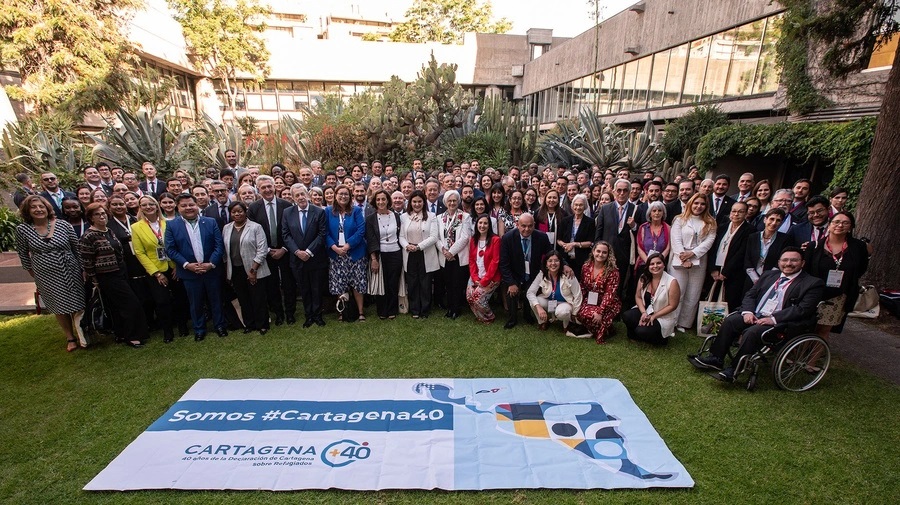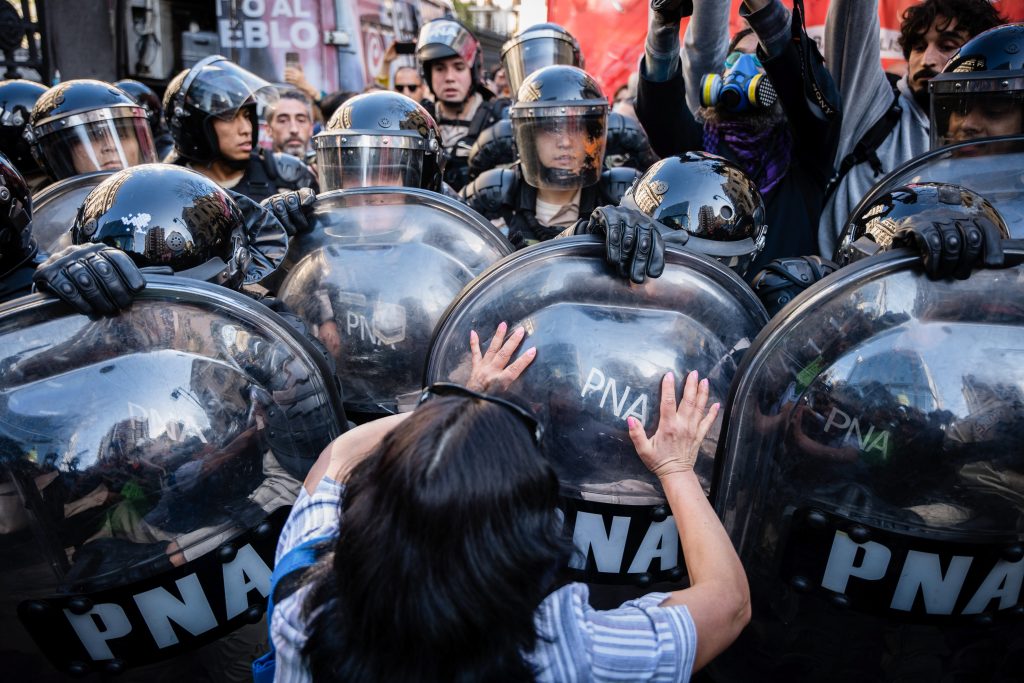This month we bring you news from Colombia, Peru, Venezuela, Chile, Argentina and Ecuador.
Highlights are:
- Colombia: Amnesty has released a new report which documents the reality experienced by the women who dedicate their lives to searching for the victims of enforced disappearance.
- Peru: Amnesty has published the stories of four of the survivors of the repression of the 2022/23 protests, highlighting how the authorities have failed to ensure their health and recovery.
- Venezuela: Nicolas Maduro has been sworn in to the Presidency, prompting outrage amongst non-governmental organisations and in other countries.
- Chile: Amnesty has issued a new Urgent Action, calling on the Senate to reject draft legislation that poses a grave threat to the rights of migrants.
- Argentina: Amnesty Argentina have published a report on the human rights situation during 2024. This explores how the economic policies and reforms have negatively impacted the lives of millions of people, especially the most vulnerable.
- Ecuador: Amnesty has published an article on how communities in the city of Guayaquil and along the country’s coast have stepped up their activism in the face of the hostile environment created by the authorities.
COLOMBIA

Amnesty has released a new report Transforming pain into rights: Risks, threats and attack on women searchers in Colombia. The report documents the reality experienced by the women who dedicate their lives to searching for the victims of enforced disappearance in Colombia, and the need for society to recognize these women and for the authorities to guarantee their rights, given the serious obstacles they face in demanding truth and justice. The report has been prepared as part of Amnesty International’s #SearchingWithoutFear campaign, which calls for the recognition and protection of women searchers across the Americas.
PERU

Amnesty has published the stories of four of the survivors of the repression of the protests that took place in different regions of Peru between December 2022 and March 2023, highlighting how the authorities have failed to ensure their health and recovery. 1,400 people were injured in different regions of Peru by bullets, pellets, and tear gas fired by the police and the army during the protests.
VENEZUALA
The BBC has run an article describing the mistreatment suffered by jailed Venezuelan activists in the aftermath of Nicolas Maduro’s disputed election win earlier this year. Interviewing an individual anonymously who spent around four months in the notorious Tocoron prison, where he was subject to torture, sleep deprivation, and malnourishment. The International Criminal Court is currently investigating the Venezuelan government for possible crimes against humanity, whilst United Nations experts in October reported serious human rights violations in the run-up to the elections.
Nicolas Maduro has been sworn in to the Presidency, prompting outrage amongst non-governmental organisations and in other countries. The US has announced a $65m bounty for his arrest, whilst the Presidents of Brazil and Colombia, longstanding regional allies, have refused to recognise Maduro’s presidency. Chile’s President, Gabriel Boric, stated that “I am someone from the left and from the political left I tell you: Nicolás Maduro’s government is a dictatorship”. EU countries have broadened sanctions against Venezuela.
CHILE

Amnesty International has issued a new Urgent Action. Last month a Commission of the Chilean Senate began debating a reform to the country’s current Migration Law that poses a grave threat to the rights of migrants, particularly the right of children and adolescents to education and health. The bill could lead to the expulsion of unaccompanied children, the indirect expulsion of minors due to their parents’ migratory status, and the arbitrary detentions of migrants and asylum seekers. Please send a letter or email calling on the Senate to reject this draft legislation.
At the end of her visit to Chile, the UN Special Rapporteur on the right to health, Tlaleng Mofokeng, urged the prioritization of health financing and the equitable allocation of resources. She said she had “repeatedly heard the worrying sentiment that in Chile, health is not a right, but a business. Powerful groups representing vested interests in the for-profit health sector tend to operate without the necessary human rights safeguards in Chile.” Ms Mofokeng also urged Chile’s Congress to amend its restrictive abortion law.
Representatives from across South, Central America and the Caribbean gathered in Santiago for the Ministerial Event of the Cartagena+40 Process. This event, on the 40th anniversary of the 1984 Cartagena Declaration on Refugees, culminated in the adoption of the Declaration and Plan of Action of Chile. This renewed their commitment to solidarity, protection and sustainable solutions for refugees, displaced people and stateless people in the region. To ensure effective implementation, the Plan establishes a monitoring mechanism led by Chile for the next decade.
ARGENTINA
 Marking the first anniversary of President Milei’s administration, Amnesty International published a report on the human rights situation in Argentina during 2024. Rights in Argentina: 12 months of management, 12 rights lost explores how the economic policies and reforms have negatively impacted the lives of millions of people, especially the most vulnerable, exacerbating inequalities and restricting fundamental freedoms. In particular restrictions on the right to protest with the “anti-picket protocol” leading to repression and criminalisation of those who took to the streets to express dissent.
Marking the first anniversary of President Milei’s administration, Amnesty International published a report on the human rights situation in Argentina during 2024. Rights in Argentina: 12 months of management, 12 rights lost explores how the economic policies and reforms have negatively impacted the lives of millions of people, especially the most vulnerable, exacerbating inequalities and restricting fundamental freedoms. In particular restrictions on the right to protest with the “anti-picket protocol” leading to repression and criminalisation of those who took to the streets to express dissent.
The Police and Human Rights Programme, part of Amnesty International Netherlands, has published a report Silencing dissent through fear. Restrictions on civic space in Argentina. This also highlights the restrictions and repression of public demonstrations and the criminalisation of protestors:- “Civic space in Argentina is shrinking. It is becoming increasingly difficult to participate, express opinions, or influence public debaters and policies without facing various forms of retaliation”.
The Abuelas de Plaza de Mayo have announced that one of the hundreds of children snatched from their parents and given up for adoption during the 1976-1983 dictatorship has been found after a long search. The individual, the 138th discovered, is the child of two left-wing political activists – Marta Enriqueta Pourtalé and Juan Carlos Villamayor – who were abducted in 1976. The couple were later seen at ESMA, one of the largest centres of torture and extermination, where more than 5,000 political prisoners were held, but only around a hundred survived, according to human rights organisations.
The “Abuelas” published a report criticizing the axing of memory policies carried out by President Milei in 2024. Describing “regressive measures” that “endanger” the process of memory, truth, and justice regarding state crimes committed between 1976-1983. This could also lead to violating international agreements on human rights that Argentina has committed to. The Inter-American Commission on Human Rights, called on the Argentine government to guarantee resources for the organizations that search for individuals stolen from their parents as babies by the country’s last dictatorship.
ECUADOR
 Amnesty has published an article about how the numerous collectives, social movements and communities in the city of Guayaquil and along the country’s coast of Ecuador have stepped up their activism in the face of the hostile environment created by the authorities in response to increased violence arising from confrontation between organised criminal groups. The government’s measures have led to allegations of human rights violations, including detentions with little transparency and without due process, stigmatisation and attacks against human rights defenders.
Amnesty has published an article about how the numerous collectives, social movements and communities in the city of Guayaquil and along the country’s coast of Ecuador have stepped up their activism in the face of the hostile environment created by the authorities in response to increased violence arising from confrontation between organised criminal groups. The government’s measures have led to allegations of human rights violations, including detentions with little transparency and without due process, stigmatisation and attacks against human rights defenders.
OUR TEAM AND YOU
Members of our team remain available to give online or face to face presentations to Local Groups on our countries. Please get in touch if you are interested.
All the best,
South America Team – David Rogers (Argentina and Chile), James Baird (Venezuela) and Graham Minter (rest of South America). And please don’t forget that you can follow us on our Facebook page and Twitter.